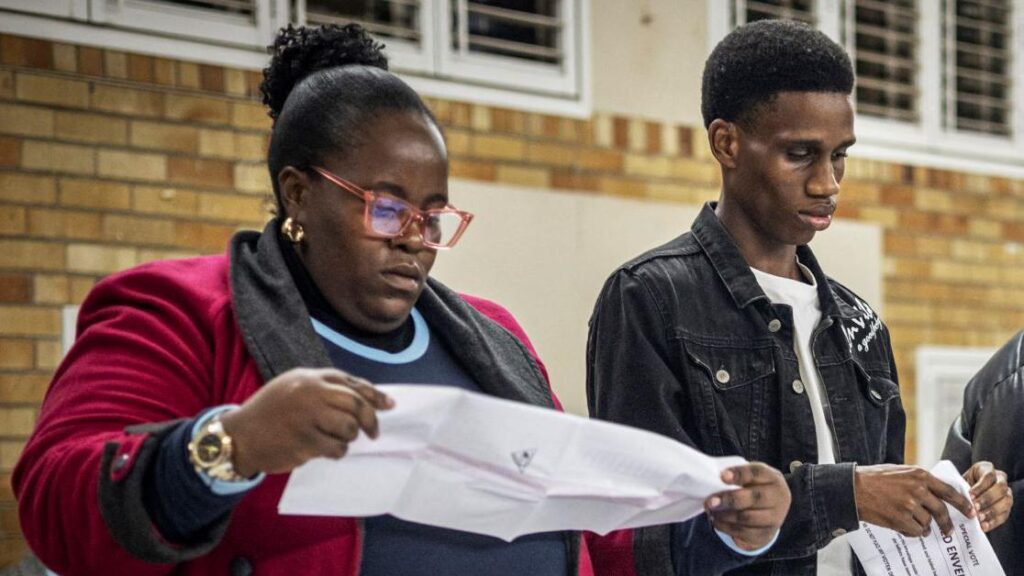The first results have been announced from what is seen as the most closely fought elections in South Africa since the African National Congress (ANC) came to power thirty years ago.
With results from about 20% of voting districts counted so far, the ANC leads with 44%, followed by the DA with 25%.
The radical EFF has about 9%, while former president Jacob Zuma’s uMkhonto weSizwe Party (MK Party) has about 8%.
Final results are expected this weekend.
Early results suggest the ANC will lose its parliamentary majority for the first time since Nelson Mandela led the party to victory after the end of the racist apartheid system in 1994.
South Africa’s News24 website has predicted that the party’s final vote could be around 42%, compared to the 57% it achieved in the 2019 election.
Early results show the ANC suffering heavy losses against MK, especially in KwaZulu-Natal, where Mr Zuma is leading with 43% of the vote compared to the ANC’s 21%.
Zuma caused a major shock when he announced in December that he would leave the ANC to campaign for MK.
KwaZulu-Natal is Zuma’s home region and the province with the second highest number of votes, making it crucial to determine whether the ANC retains its parliamentary majority.
Although Mr Zuma has been barred from running for parliament due to a conviction for contempt of court, his name still appeared on the ballot paper as MK leader.
If MK wins KwaZulu-Natal it would be a “major shock” and herald the “potential decimation” of the ANC in the province, political analyst William Gumede told the BBC.
The ANC also risks losing its majority in Gauteng’s economic heartland, where the party currently has 36% to the DA’s 29%.
Wednesday’s election saw long lines of voters outside polling stations across the country well into the night.
The main problems for voters were widespread government corruption, high unemployment and rampant crime.
An election official in Johannesburg told the BBC that the lines were reminiscent of the historic 1994 election, when black people could vote for the first time.
Sifiso Buthelezi, who voted at Joubert Park in Johannesburg – the largest polling station in South Africa – told the BBC: “Freedom is great, but we have to tackle corruption.”
Change has been a recurring sentiment, especially among young voters.
Ayanda Hlekwane, one of South Africa’s ‘born-free’ generation, i.e. born after 1994, said he is still jobless despite having three degrees.
“I’m working on my PhD proposal so that I can go back to study if I don’t get a job,” he told the BBC in Durban.
But Mr Hlekwane said he was optimistic things would change.
There were a record 70 parties and 11 independents, while South Africans voted for a new parliament and nine provincial parliaments.
Analysts say this shows that many people are disappointed with the ANC.
“We are entering the next phase of our democracy, and it will be a big transition,” political analyst Richard Calland told the BBC.
“We will either become a more competitive and mature democracy, or our politics will become even more fragmented.”
The main opposition party, the Democratic Alliance (DA), has signed a pact with ten other parties, agreeing to form a coalition government if they receive enough votes to oust the ANC from power.
But this is highly unlikely as the ANC is expected to remain the largest party, putting it in pole position to lead a coalition if support falls below 50%.
South Africans do not vote directly for a president. Instead, they vote for members of parliament who will then elect the president.
Current President Cyril Ramaphosa will therefore probably remain in power.
More than 27 million people were registered to vote, including a high percentage of young voters, who could be decisive.
Artist Njabulo Hlophe, 28, said young people in South Africa tend to be marginalised, but: “This is our country as much as our parents… they leave it up to us, so someone who really cares the young people is someone I really look at”.
It is expected that support for the ANC will be greater among the older generation.
An 89-year-old woman, Elayne Dykman, told the BBC in Durban that she hoped young people in South Africa would not take their vote for granted.
Additional reporting by Anne Soy in Durban and Barbara Plett Usher in Soweto
You may also be interested in:
Go to BBCAfrica.com for more news from the African continent.
follow us on twitter @BBCAfricaon Facebook at BBC Africa or on Instagram at BBCAfrica
BBC Africa Podcasts

